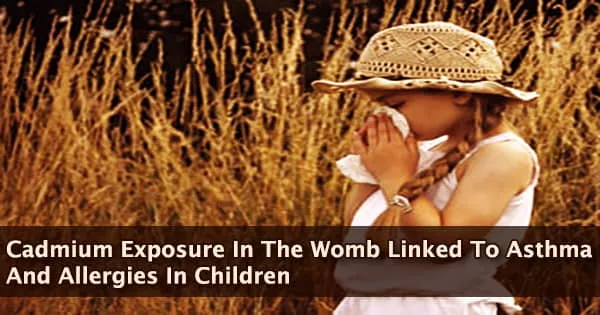According to a study presented at the European Respiratory Society International Congress, babies born with greater levels of cadmium in their umbilical cord blood are more likely to develop childhood asthma and allergies.
Cadmium is known to be harmful to human health, and its usage is prohibited in the European Union, yet it has a long history of use, including in batteries, pigments, and as a protective coating for other metals. It’s also in tobacco, and it can get into your system by smoking or passive smoking.
The findings, according to the researchers, suggest strict limits on the use and disposal of cadmium.
Professor Isabella Annesi-Maesano, research director at France’s Institut national de la santé et de la recherche médicale (INSERM) and head of the epidemiology of allergic and respiratory diseases department of the Institute Pierre Louis of Epidemiology and Public Health, INSERM and Sorbonne Université, Paris, France, presented the findings at the virtual conference.
She said: “Cadmium is a type of heavy metal. We know that people can be exposed to heavy metals through food, water, and air, and even very small amounts can have damaging effects on our health.”
“We wanted to investigate the levels of certain heavy metals that babies are being exposed to in the womb and to understand any impact this could have on their development and future health.”
Cadmium is a type of heavy metal. We know that people can be exposed to heavy metals through food, water, and air, and even very small amounts can have damaging effects on our health. We wanted to investigate the levels of certain heavy metals that babies are being exposed to in the womb and to understand any impact this could have on their development and future health.
Isabella Annesi-Maesano
706 women and their newborns were enrolled in the study, who were being cared for in maternity units in Nancy and Poitier, France. The amounts of three heavy metals, cadmium, manganese, and lead, were tested in the women’s blood during pregnancy and in blood obtained from their babies’ umbilical cords after delivery.
The children were followed up until they were eight years old to see if they acquired asthma, allergic rhinitis, eczema, or food allergies. They also took into account known influences on these disorders, such as the children’s medical history and whether or not their parents smoked.
The mothers’ blood had an average of 0.8 micrograms of cadmium per litre (?g/L) while the cord blood contained an average of 0.5?g/L.
Higher levels of cadmium discovered in babies’ umbilical cord blood (above 0.7?g/L) were associated to a possible increased risk of asthma of around 24 percent, and a likely rise in the risk of food allergies of around 44 percent, compared to lower levels (below 0.3?g/L).
In comparison to lower levels (below 0.5 g/L), higher levels of manganese in the mothers’ blood were connected to a probable increase in the risk of eczema. Eczema is a well-known risk factor for asthma.
Professor Annesi-Maesano added: “We know from previous research that different types of heavy metals can affect different organs in the body. Our study suggests that exposure to cadmium in the womb could have a role in increasing the risk of asthma and allergies in children.”
“Our study doesn’t tell us why this might be the case, but it could be that cadmium is interfering with babies’ developing immune systems and we think this can have an impact on their allergic reactions in childhood.”
“We need more research to confirm these findings and to understand more about the links between exposure to heavy metals in the womb and children’s health in the longer term.”
Professor Annesi-Maesano and her colleagues are still researching the effects of heavy metals and other environmental contaminants on asthma and allergies.
Daiana Stolz is the Chair of the European Respiratory Society’s (ERS) Education Council and a Professor of Respiratory Medicine and a renowned physician at the University Hospital Basel in Switzerland. She was not engaged in the study.
She said: “We know that heavy metals that are present in many everyday products can be damaging to health if they enter our bodies through the air we breathe, or our food and drink. It’s particularly worrying to know that cadmium and other metals might be reaching unborn babies via the umbilical cord.”
“We need to understand the possible causes of asthma and allergies in children so we can try prevent these conditions. This research indicates that higher levels of cadmium in cord blood could have an influence on children’s risk of asthma and allergies, but it’s a small study, so we do need to keep investigating this issue.”
Given the known risks of cadmium and other heavy metals, this study advocates for strict regulation of their usage and careful disposal of cadmium-containing devices, such as batteries.





